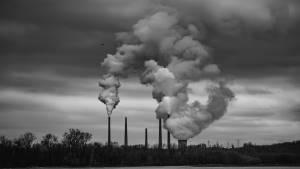
Air Pollution Definition
Air pollution is caused by the release of toxins into the air from various sources, such as factories, power plants, and automobiles.
The main source of air pollution is from the burning of fossil fuels, such as coal, oil, and natural gas.
This can cause a number of health problems, including heart disease, cancer, asthma, and lung disease.
Air pollution is one of the leading environmental risks to human health.
It has been linked to an increased risk of the development of lung cancer, heart disease, and stroke.
It can also result to respiratory problems, such as bronchitis and asthma. The impact of air pollution on human health is huge.
Also Read : Air Pollution Short Essay
Air Pollution Effects
Air pollution affects people in a variety of different ways.
It causes people to experience respiratory problems and lung diseases, as well as a decrease in lifespan.
It also affects the brain and nervous system, leading to decreased cognitive ability. For 1 in 8 deaths worldwide is also caused by air pollution.
It is important to reduce your risk of being affected by air pollution by avoiding cars, wearing a mask, and taking other precautions.
Air Pollution Solutions
Air pollution is the presence of harmful atmospheric particles or gases in the atmosphere that cause harm to humans and the environment.
Air pollution is behind the respiratory problems, heart disease, and cancer.
Many air pollutants come from human activities, such as the burning of fossil fuels, agricultural burning, manufacturing, and motor vehicle emissions.
Other air pollutants come from nature, such as dust and smoke from wildfires, volcanoes, and forest fires.
Air pollution is also an environmental issue that can have a significant impact on natural resources.
Air pollution is a significant issue in today's world.
It affects the quality of life for millions of people. The effects of air pollution are not limited to the environment.
It affects people's health, affecting their quality of life.
Air pollution is a significant issue in today's world. It affects the quality of life for millions of people.
The effects of air pollution are not limited to the environment. It affects people's health, affecting their quality of life.
Air Pollution Causes
Air pollution is caused by the burning of fossil fuels and the release of toxic chemicals into the atmosphere.
These pollutants can take the form of smoke, dust, soot, and other types of particles.
The main reason for this is the use of fossil fuels, which causes the release of carbon dioxide, methane, and other greenhouse gases into the atmosphere.
These gases trap heat in the atmosphere, which in turn leads to climate change.
What are some of the effects of Air Pollution?
Air pollution has a number of effects on people and the environment. These effects can include the following:
- The production of acid rain
- The production of smog;
- The production of ozone
- The production of ground-level ozone
- Increased levels of particulate matter in the air
- Increased rates of respiratory and cardiovascular diseases
- Increased rates of asthma
- Increased rates of cancer
- Increased levels of premature death
What are some of the types of air pollution?
There are many types of air pollution. These include:
- Smog
- Acid rain
- Soot
- Ground-level ozone
- Particulate matter
- Greenhouse gases
How is air pollution spread?
Air pollution is spread from the ground up by the wind and by the water.
Each time the wind blows, it carries the pollution up into the air.
Also, the water carries pollution down from the ground. This is why air pollution is so dangerous.
When the air pollution is so thick that you can't see any more than a few feet in front of you, it's called smog.
Smog is an air pollution problem that comes from the ground up.
What are the impacts of air pollution?
Air pollution can have a lot of impact on the human body.
It can cause respiratory problems, lung cancer, asthma, and even premature death.
Air pollutants can be emitted from industrial plants and cars. This pollution can be inhaled and then absorbed by the body.
In addition, air pollutants can also be exhaled by the body.
This can cause a lot of health problems, including respiratory problems and premature death.
What can be done about air pollution?
The only real way to prevent air pollution is to not produce it in the first place.
This is a tall order, since we are constantly exposed to air pollution, but there are a few things that you can do to reduce your exposure.
One way is to only use natural cleaners and try to avoid using chemicals that are not safe for the environment.
If you do happen to use chemicals, make sure to dispose of them properly.
Another way to reduce your exposure is to use a car that is equipped with an electronic fuel injection.
This will help to reduce the amount of carbon dioxide that your car produces.
Finally, you can also consider switching to a more energy-efficient type of heating and cooling system.
What are the environmental impacts of air pollution?
Air pollution is a major concern for the world today. It is a leading cause of death and is a major contributor to climate change.
Air pollution is caused by large numbers of small particles, such as dust, dirt, soot, smoke, and ash.
Air pollution is also caused by more significant particles, such as smoke and ash, which are released when forest fires, industrial activity, and other sources of air pollution are set off.
Air pollution has a variety of negative impacts on the environment.
Air pollution can cause a decrease in : -
- Agricultural production, which in turn can lead to a decrease in food production.
- physical activity.
- the quality of life.
- the size of forests, which can lead to a decrease in the amount of oxygen in the air.
- the amount of precipitation, which can lead to a decrease in the amount of water in the air.
- the number of natural plant and animal species.
How can air pollution be reduced?
A lot of people think that the best way to reduce air pollution is to just drive less. But this is not the best option.
If you drive less, you are not only reducing the number of cars on the road, but you are also reducing the amount of pollution.
You can do more to reduce air pollution by taking public transportation, carpooling, walking, or biking.
You can also reduce air pollution by recycling, using energy-efficient appliances, and planting trees.
